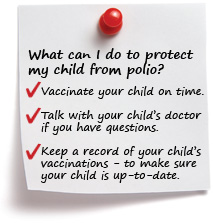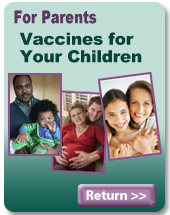Polio - Fact Sheet for Parents
Diseases and the Vaccines that Prevent Them
Español: Polio
Printer friendly version[389 KB, 2 pages]
Many people think that poliovirus always causes polio, which can cause lifelong paralysis. However, some people may get infected with poliovirus and not develop any symptoms, while others may have minor symptoms.
Benefits of polio vaccine
- Saves lives.
- Protects young children from serious disease and lifelong disability.
Side effects of the polio vaccine
- The most common side effects are usually mild and include redness and pain from the shot.
What is polio?
Polio (or poliomyelitis) is a disease caused by poliovirus. It can cause lifelong paralysis (can’t move parts of the body), and it can be deadly. But, the polio vaccine can protect against polio.
What are the symptoms of poliovirus infection?
Most people who get infected with poliovirus do not have any symptoms.
A small number of people (4 to 8 people out of 100) will have flu-like symptoms. These symptoms usually last 2 to 5 days then go away on their own.
In rare cases, poliovirus infection can be very serious. About 1 out of 100 people will have weakness or paralysis in their arms, legs, or both. This paralysis or weakness can last a lifetime.
How serious is polio?
The risk of lifelong paralysis is very serious. Even children who often seem to recover fully can develop new muscle pain, weakness, or paralysis as adults, 30 or 40 years later.
About 2 to 5 children out of 100 who have paralysis from polio die because the virus affects the muscles that help them breathe.
 How does polio spread?
How does polio spread?
Poliovirus is very contagious. The virus lives in an infected person’s throat and intestines. It spreads through contact with the feces (stool) of an infected person and through droplets from a sneeze or cough. You can get infected with polio if you have stool on your hands and you touch your mouth. Also, if you put objects, like toys, that have stool on them into your mouth, you/your baby can get infected.
An infected person may spread the virus to others immediately before and usually 1 to 2 weeks after developing symptoms. The virus may live in an infected person’s feces for many weeks. It can contaminate food and water in when people do not was their hands.
What is the polio vaccine or IPV?
IPV is a type of polio vaccine. IPV stands for inactivated polio vaccine. It is given by a shot.
Polio vaccine protects children by preparing their bodies to fight the polio virus. Almost all children (99 children out of 100) who get all the recommended doses of IPV will be protected from polio.
Why should my child get the polio vaccine?
Polio vaccine prevents polio. Even though no polio cases have originated in the United States in over 30 years, the disease is still in other parts of the world. It would only take one traveler with polio from another country to bring polio back to the United States.
When should my child get the polio vaccine?
Children should get four doses of IPV at the following ages for best protection:
- First dose at 2 months
- Second dose at 4 months
- Third dose at 6 through 18 months
- Fourth (booster) dose at 4 through 6 years of age
Is the polio vaccine safe?
IPV is very safe and effective at preventing polio. Vaccines, like any medicine, can have side effects. But, severe side effects from IPV are very rare.
If my child does not get the polio vaccine, will he get polio?
Without the vaccine, polio spreads very easily. Before the polio vaccine, more than 20,000 people got paralyzed from polio in the United States each year. Today, thanks to the vaccine, there is no more polio in the United States. But, if people stopped vaccinating, we could see cases of polio again.
How can I learn more about the polio vaccine?
To learn more about the polio vaccine or other vaccines, talk to your child’s doctor.
Call 800-CDC-INFO (800-232-4636) or go to the CDC Vaccines web site and check out the following resources:
Fact Sheets for Parents
Diseases and the Vaccines that Prevent Them
![]() This symbol means you are leaving the CDC.gov Web site. For more information, please see CDC's Exit Notification and Disclaimer policy.
This symbol means you are leaving the CDC.gov Web site. For more information, please see CDC's Exit Notification and Disclaimer policy.
Copyrighted images: Images on this website which are copyrighted were used with permission of the copyright holder and are not in the public domain. CDC has licensed these images for use in the materials provided on this website, and the materials in the form presented on this website may be used without seeking further permission. Any other use of copyrighted images requires permission from the copyright holder.
Contact Us:
- Centers for Disease Control and Prevention
1600 Clifton Rd
Atlanta, GA 30333 - 800-CDC-INFO
(800-232-4636)
TTY: (888) 232-6348 - New Hours of Operation
8am-8pm ET/Monday-Friday
Closed Holidays - cdcinfo@cdc.gov




